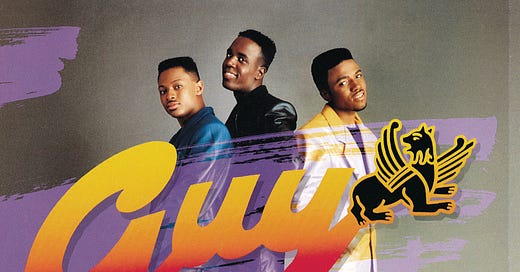The New Jack Swing is a musical genre that originated in the latter half of the 1980s. It is characterized by an upbeat fusion of hip-hop's raw dynamism and R&B's silky melodiousness. At the vortex of this musical cyclone were Teddy Riley and his group Guy, whose self-titled debut album in 1988 crafted the blueprint for this new sonic epoch.
Teddy Riley, Aaron Hall, and Timmy Gatling, collectively known as Guy, entered the late-80s music scene like a lightning strike, adding vibrant hues to the monochromatic palette of the era's popular music. Guy, their self-titled debut offering, weaved together rhythmic soundscapes that were polished yet effervescent, embodying the fresh and edgy spirit of the New Jack Swing movement. The album made an audacious statement about the group's vision, igniting an intoxicating fire that would rapidly consume the popular music world.
“Groove Me,” the album's energetic opener, set the tone. The composition showcased Guy's ability to effectively combine the unbridled vigor of hip-hop with the captivating charm of R&B through its high-octane beats. Teddy Riley's musical dexterity is evident in the compelling rhythmic structures he builds, filled with energetic percussions and underpinned by catchy bass lines. Aaron Hall's powerful vocals exhibit a soulful depth, harkening back to traditional R&B's emotional resonance while injecting a pulsating new energy that signified the dawn of a new era.
Delving deeper into the album tracks like “Teddy's Jam” and “Don't Clap…Just Dance” further underscored Guy's intuitive understanding of the cultural milieu they were operating within. The amalgamation of lyrics, production, and diverse influences resulted in an album that effectively captured the spirit of the late 1980s.
“I Like,” arguably the album's crown jewel, beautifully encapsulates the group's distinct blend of sizzling beats and soulful harmonies. The engaging synth motifs that thread through the track amplify the sense of rhythmic dynamism. Aaron Hall's impassioned delivery heightens the song's emotional texture, while the catchy chorus, brimming with infectious energy, adds to the track's enduring appeal.
But the genius of Guy extends beyond their knack for crafting vibrant dance tracks. Ballads like “Goodbye Love' and 'Piece of My Love” showcase a more nuanced side of their artistry, revealing their ability to evoke deep emotions through slow, simmering tunes. The group profoundly understands R&B's essence in these tracks, evoking powerful sentiments through their skillful blending of melancholic melodies and evocative lyrics.
What makes Guy an album of immense historical and cultural significance is its refusal to be pigeonholed. The sound exhibited a strong foundation in R&B and hip-hop traditions yet demonstrated a willingness to deviate from conventional standards and carve out a unique trajectory. This ethos was evident in Teddy Riley's innovative production techniques, which often played with contrasting sound textures to create a unique sonic signature. Riley's contributions to the album and Keith Sweat's debut established his standing as one of the most impactful R&B producers of the 1980s.
Guy was a watershed moment in music history. With this album, Guy didn't just introduce the world to New Jack Swing; they redefined the contours of R&B, marking the beginning of a new era in music that continues to reverberate. This album was the catalyst that spurred a whole new movement. This sonic revolution influenced contemporary R&B. Guy was a game-changer, an audacious leap into music, and its reverberations are still felt more than three decades later.




